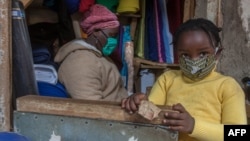Malawi has made wearing masks mandatory in public places in an effort to curb a surge in COVID-19 cases.
The Presidential Task Force on COVID-19 said the rule went into effect Friday night, and those who do not adhere to it will pay a fine of about $15. Some rights activists, however, say the government should have first distributed free masks to make the rule justifiable.
The mandate on face coverings is among various measures Malawi has taken to try to contain the COVID-19 surge. Other steps include barring traffic police from touching a driver's license or any other documents.
All markets, shops and businesses that are in close proximity to hospitals have been ordered to close.
The government also has banned public gatherings, such as weddings, parties and bridal showers.
The restrictions come as Malawi continues to confirm increasing cases of COVID-19, with an average of 100 cases per day. As of Saturday, Malawi had registered 4,575 coronavirus cases with 137 deaths.
What about violators?
Health rights campaigners commend the measures but say they raise more questions than answers.
George Jobe, executive director of the Malawi Health Equity Network, said that "as we are hearing that the masks will be compulsory, the question will be: What will follow if someone fails to pay prescribed fees?”
Jobe also said the rules have failed to address whether the government will provide free masks to people who cannot afford to buy them.
According to U.N. data, about 70% of Malawi’s population lives below the international poverty line of $1.90 per day.
Hilda Kalonga, a subsistence farmer in the Thyolo district in southern Malawi, told VOA she has not worn a mask since Malawi registered its first three COVID-19 cases April 2.
"I cannot manage to buy a mask because I cannot get money to buy one," she said. "It would make sense should the government start distributing masks for free before it made the wearing of masks compulsory.”
John Phuka, chairperson of the Presidential Task Force on COVID-19, told VOA on Saturday that the government already had signed a memorandum of understanding with local mask manufacturers to start distributing free masks to those who cannot afford them.
Phuka said those flouting the rule would pay a fine of about $15.
In the meantime, Phuka said, law enforcement officers have been given permission to use “reasonable force” to enforce compliance.




